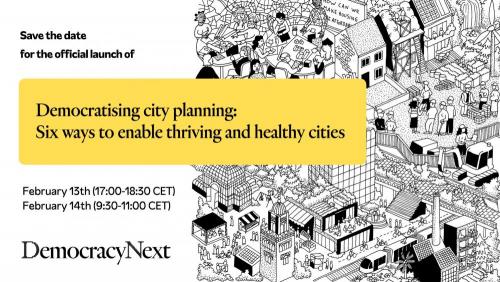
https://www.demnext.org/projects/cities?utm_source=substack&utm_medium=e...
On 13 and 14 February, we invite you to join our virtual panels to discuss the paper with task force members. Session 1 features DemocracyNext Project Lead for Urban Planning James MacDonald-Nelson, DemNext Founder/CEO Claudia Chwalisz, architect, planner and founder of Creative Urban Alchemy Ifeoma Ebo, and Manager, Public Consultation, Parks, Forestry & Recreation, at the City of Toronto Daniel Fusca; Session 2 features James MacDonald-Nelson, Claudia Chwalisz, Associate Professor at TU Delft in the Netherlands Trivik Verna, and Senior Project Leader, BUUR Part of Sweco & Co-founder of Cakri asbl Diego Luna Quintanilla.
We are excited to apply these ideas to the real world. To that end, we’ve launched an Open Application for cities to apply to partner with us, to contextualise, and implement the ideas outlined in the proposal. More at our website.
The future of the cities we inhabit and where we spend our daily lives matters to all of us in very tangible ways. This future is also collective. We share the spaces we call home with numerous beings. Balancing a diversity of people’s needs and preferences, concerns for environmental and social justice, a flourishing living planet, sustainability and resilience, communities’ health and well-being, as well as a desire for beauty, joy, and belonging is no easy feat. So many of these things are interconnected and are directly and deeply impacted by urban planning and the multiple other decisions we take about our built environment.
Over nine months of consultations, we have found there is general agreement amongst different actors in the urban planning ecosystem – planners, architects, city government officials, mayors and elected councillors, investors, developers, civil society organisations, and citizens – that the current decision-making system is not equipped to tackle today’s challenges in a dynamic, effective, or inclusive way.
Those challenges include:
-
Affordable housing crisis: Many cities are confronted with a real housing crisis and decisions on how to address this are often stuck. They face a shortage of affordable housing, leading to rising homelessness and housing insecurity for large segments of the population.
-
Population growth is straining resources: Rapid urbanisation is leading to increased demand for housing, transportation, services, and infrastructure, putting a strain on existing resources. This dynamic conflicts with challenges of land capture and inequitable distribution of wealth that directs resources away from where they are needed the most.
-
Environmental sustainability: Climate change, air pollution, loss of biodiversity and green space, and natural disasters pose significant threats to cities, necessitating strategies for resilience, sustainable development, nature-based solutions, and emissions reduction. Cities in regions prone to natural disasters (such as earthquakes, hurricanes, or floods) face the additional challenge of preparing for and responding to these extreme events.
-
Public health and well-being: Issues such as mental health challenges, the opioid epidemic, an ageing population, and responses to public health emergencies like pandemics pose significant challenges for city governments.
-
Inequality and inclusion: Cities often struggle with disparities in income, access to education, healthcare, and opportunities, all of which disproportionately affect minoritised communities, which can also be linked to issues of social cohesion, tensions, and divisions.
-
Accessible mobility is not available to everyone: Accessibility and proximity to multi-modal mobility options and other public services and facilities is not evenly distributed amongst the population.
The challenges that cities face today are not only a result of the specific decisions made in recent decades, but also stem from the way in which these decisions have been made. We see a need to change how people are integrated into the process of urban planning to create better, bolder, consensus-driven solutions to the complex challenges outlined above, in a way that engenders much greater legitimacy. This demands a departure from the status quo.
For more effective and inclusive decision making that enables action and gives people agency to shape their cities into thriving and healthy places, people should be able to wield greater power in shaping those decisions in an ongoing way, not only by voicing their opinions in town hall meetings, or as part of formal or mandatory consultation processes.
This proposal is not simply about improving one-off participation processes, it is about enriching and expanding how we engage with people by creating a deeper culture of engagement that can enable the conditions for a systemic, structural shift.
Who makes these decisions, and how they are made matter greatly. We argue that the ‘who’ and the ‘how’ of urban planning decision making need to change. To live in thriving and healthy cities, we propose six possible ways to instigate systemic changes that can democratise the governance of urban planning decisions through Citizens’ Assemblies and connected participatory approaches.
Depending on a city’s current starting point, at least one, if not multiple, of these options can be seen as an initial ‘way in’ to begin making systemic changes to urban planning decision making.









